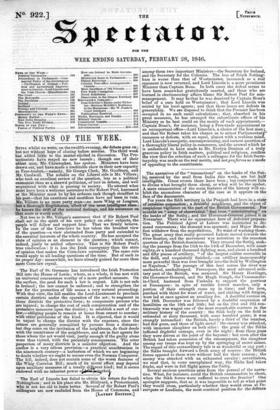The Earl of St. Germans has introduced the Irish Protection
Bill into the House of Lords; where, as a whole, it has met with an universal concurrence worthy of a more perfect measure. On the surface, the need for such a law is urgent. Life is not safe in Ireland ; the law cannot be enforced ; and to strengthen the law for the protection of life seems a very natural proceeding. With that view, the bill enables the Lord-Lieutenant to proclaim certain districts under the operation of the act ; to augment in those districts the protective force ; to compensate persons who are injured ; to charge the cost of such compensation and of the protective measures upon the district ; to establish a sort of cur- few,—obliging people to remain at home from sunset to sunrise- with other provisions of the kind. It is objected, that it would be unjust to charge the district with the expenses, since the crimes are generally committed by persons from a distance : but they come on the invitation of the neighbours, do their deeds with the connivance of the neighbours, and are in fact agents for those whom the act would visit, justly enough if the guilty alone were thus visited, with the pecuniary consequences. The utter pauperism of many districts is a sounder objection. And the curfew is a very odious provision—a practical anachronism in the nineteenth century—a barbarism of which we are beginning to doubt whether we ought to accuse even the Norman Conqueror. The bill, indeed, does not contain some of the worst features of the Whig Coercion Bill ; much of its moral effect may depend upon auxiliary measures of a totally diftgrent kind; but it seems endowed with no inherent power olfesaagawerkel.


























